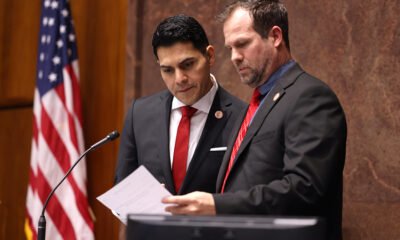Business
Bipartisan Coalition Forms to Combat Housing Crisis and Homelessness

A bipartisan coalition of legislators has officially launched a housing and homelessness caucus aimed at fostering collaboration on housing policy during the current legislative session. The primary objective: to pass the Arizona Starter Homes Act.
House Majority Leader Leo Biasiucci, R-Lake Havasu City, articulated the group’s commitment to ensuring diverse perspectives are represented, stating, “The starter home bill is what we need to get done.” He emphasized the caucus’s purpose during a press conference on January 15.
Biasiucci, alongside Sen. Analise Ortiz, D-Phoenix, is spearheading the caucus. Both legislators previously engaged in negotiations for last year’s Starter Homes Act, a proposal met with significant pushback from city leaders concerned it may not result in the construction of affordable homes.
The 2024 iteration of the Starter Homes Act aimed to eliminate zoning restrictions that limit smaller lot sizes and would have barred new developments from enforcing homeowners associations on property owners. Ultimately, it faced substantial opposition and was vetoed by Governor Katie Hobbs, who raised public safety concerns.
In her recent State of the State Address on January 13, Hobbs reaffirmed her commitment to addressing housing issues, declaring, “We must further cut the red tape that’s driving up the cost of housing.” She cited successful efforts in expanding housing options, including casitas and multi-family units, but indicated the need for more sustainable solutions.
The governor’s housing agenda includes four key components: extending the low-income housing tax credit, regulating short-term rentals, and doubling assistance for first-time homebuyers through the Arizona Is Home program. Biasiucci expressed hopes that the caucus can find common ground with both the League of Arizona Cities and Towns and the governor’s office regarding the Starter Homes Act.
“By convening experts, advocates, and policymakers, we aim to develop comprehensive solutions to ensure everyone has access to safe and stable housing,” Ortiz stated, highlighting the urgency of the housing crisis in America.
The League of Arizona Cities and Towns is also preparing to propose its version of the Starter Homes Act, with legislative director Nick Ponder noting that their bill may focus heavily on reduced lot sizes and conditional requirements for affordable units. He criticized the prior bill’s lack of stipulations ensuring homes would be affordable.
So far, no version of the Starter Homes Act has been introduced for the 2025 session. Biasiucci indicated that the caucus may file their proposal following ongoing discussions. Additionally, the caucus aims to explore various housing measures and assist lawmakers in refining their proposals.
Sen. Catherine Miranda, D-Laveen, has introduced SB1043, proposing that cities with more than 75 homeless individuals must provide at least one shelter bed for every four people lacking housing. Although she believes she can secure bipartisan support for her measure, Biasiucci expressed uncertainty, citing his lack of familiarity with her proposal.
Rep. Selina Bliss, R-Prescott, also attended the press conference. She has previously filed bills to regulate short-term rentals and is pushing forward with HB2131, aimed at requiring online rental marketplaces to verify compliance with Arizona’s licensing and insurance standards.
There has been historical resistance among Republican lawmakers to regulating short-term rentals, following a 2016 law limiting local authority on these properties. In response, cities like Scottsdale and Sedona have identified short-term rentals as contributors to local housing crises.
While some Democrats argue that short-term rentals are not the primary challenge in Arizona’s housing market, Ortiz maintains that the caucus can effectively unite diverse voices to advocate for collective solutions. “We won’t agree on everything,” Ortiz acknowledged, “but this caucus helps amplify the voices affected by these issues.”


















